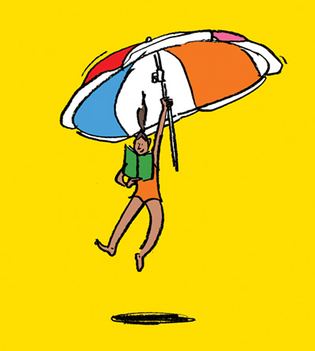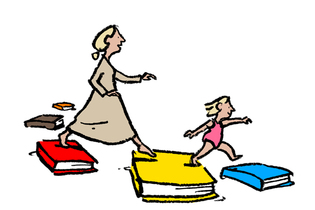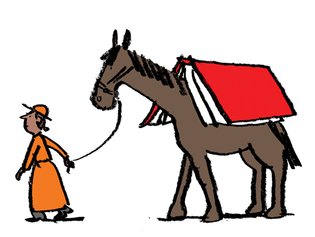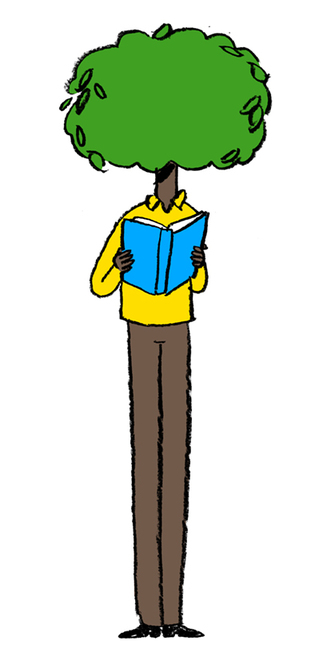
Ryan Gillett
Whether or not you still live on an academic calendar, summer somehow feels like a time to get away. Some of us do it literally, traveling to new places every summer or returning to traditional haunts. Others take advantage of long days to just spend time outside.
Many of us shake up our reading habits in the summer, too. A few years ago, when I realized that I had reached late middle age without reading a single book by Charles Dickens, I resolved to read one of his novels every summer, and I’m so glad I did. (The project continues; I have four to go.)
From time to time, the magazine asks Yale faculty members to recommend their favorite books to our readers. This year—when it feels like current events have a stranglehold on our attention and it’s hard to look away from the latest headline or hot take—we had a more specific question: could they recommend an engaging book that might help transport readers away from the here and now?
Not surprisingly, the suggestions they offered are far from frothy beach reads. A couple of professors suggested books about road trips—one involving a fictionalized Jorge Luis Borges and another that doubles as a meditation on French-Canadian identity. The dean of the School of Management, it turns out, escapes to a history of the American Revolution, and a classics professor loses himself in the letters of a woman homesteader on the western frontier.
We hope you find something here to lead you on your own escape this summer. I’m going to be trying some of these—as soon as I finish Martin Chuzzlewit. —Mark Alden Branch ’86, executive editor
___________________________________________________________________
Alice Kaplan ’81PhD
Sterling Professor of French
Borges and Me: An Encounter
Jay Parini
(Doubleday, 2020)
In this madcap road novel, an American graduate student with everything to learn about life and literature serves as a panicked tour guide in the Scottish Highlands for the frail, blind, annoying, and ultimately lovable Argentine writer Jorge Luis Borges. The dialogue between Borges, in whom all of literature lives, and young Parini, his ingénu, is irresistible. And when the duo ventures out in a rowboat onto Loch Ness, Borges nearly kills them by standing to recite Beowulf in “the language of the blunt-tongued Anglo-Saxons.” A film adaptation staring Luis Gnecco as Borges is in the works.
Michael Koelle
Professor of Molecular Biophysics and Biochemistry
The Eighth Day of Creation
Horace Freeland Judson
(first published in 1979)
My favorite book of “popular” science lets non-scientists experience the excitement and the suffering of scientific research. It recounts the “heroic era” in biology (1930 to 1970) when scientists discovered what DNA does and cracked the genetic code. The author interviews the scientists who did the work and delightfully lets them explain what happened in their own words. The book includes lots of juicy personal anecdotes and gives you photos of these colorful characters. If you are bored by classroom/textbook science, try this. Or maybe you love classroom/textbook science but want to hear the gossip that usually only insiders know about?
Harold Hongju Koh
Sterling Professor of International Law
An Unfinished Love Story: A Personal History of the 1960s
Doris Kearns Goodwin
(Simon & Schuster, 2024)
A couple was married for more than forty years. Then the husband passes, leaving behind hundreds of boxes of letters, diaries and documents from his life before marriage as a speechwriter to JFK and a policy advisor to LBJ. The surviving historian spouse digs into the morass of papers and finds answers about historical episodes from an ostensibly simpler time. She learns new things about the husband she lost, the life commitments they shared, and the world events that brought us to where we are today. It’s about looking back to understand how we should live going forward.
Peter Salovey ’86PhD
President Emeritus, Sterling Professor of Psychology and Professor of Management, Public Health, & Sociology
The Covenant of Water
Abraham Verghese
(Grove Press, 2023)
The last time the Yale Alumni Magazine asked me to recommend a favorite book for summer reading I suggested Abraham Verghese’s Cutting for Stone, his beautifully rendered novel about twin brothers set all over the world, from Addis Ababa to the Bronx. One might not have expected such rich storytelling from the vice chair for the theory and practice of medicine at the Stanford University School of Medicine, but in fact I couldn’t stop reading that book.
So for the current summer, it is easy for me to recommend another Verghese novel blending medicine and world history. The Covenant of Water provided a deep understanding of cultural attitudes toward leprosy, as well as the special political and cultural leanings of the South Indian state of Kerala. We meet interesting characters in this matrilineal society and grieve over generational tragedies, and we discover family secrets that leave us wondering whether it is possible ever to really know another person.
Pericles Lewis
Dean of Yale College
Deaf Sentence: A Novel
David Lodge
(Penguin Books, 2009)
Lodge, who passed away at the beginning of 2025 at the age of 89, was an English professor before he became famous as a campus novelist. I have been rereading his books this year. Deaf Sentence, published when he was in his 70s, tells the story of a retired linguistics professor who is losing his hearing while facing family troubles associated with aging. While retaining the humor of his early novels, it has an added level of complexity and seriousness as it considers human frailty and mortality. Not exactly beach reading, but a very meaningful book.

Ryan Gillett
Meghan O’Rourke ’97
Editor of the Yale Review, professor in the practice, English and creative writing
The Summer Book
Tove Jansson
(published in English in 1974)
One of my favorite books to return to, especially in summer, is Tove Jansson’s The Summer Book. Set on a small Finnish island, it follows a grandmother and granddaughter through the quiet rhythms of the season. It’s a gentle, quietly radical meditation on nature, mortality, and companionship—reminding us how much can be found in moments of close attention. Slowly, one realizes it’s also a book about grief, which makes it feel especially resonant in this chaotic moment. It offers a model for the sustaining power of radical attention and a deeply autonomous imagination—and pulls the reader into a state of such attention.
Maggie Millner
Lecturer in English
The Last Samurai
Helen DeWitt
(first published in 2000)
I’m currently reading The Last Samurai by Helen DeWitt for the first time, which has transported me not only to late-1990s London, but also to Ancient Greece, the Mongolian Steppe, and Sengoku-era Japan. It’s one of the most formally ambitious and large-hearted novels I’ve encountered in quite some time, and it’s a testament to the pursuit of knowledge for its own sake. A book that is at once an immersive read and an homage to the act of reading itself? Sign me up!
Daphne A. Brooks
William R. Kenan Jr. Professor of African American studies, American studies, women’s gender & sexuality studies, and music
Toni at Random: The Iconic Writer’s Legendary Editorship Dana A. Williams
(Amistad, 2025)
Dana A. Williams has written what promises to be the definitive study of literary lioness Toni Morrison’s role as a landmark editor at Random House. This is a work that uses Morrison’s extensive archival materials to tell a big story of creativity, collaboration, and intellectual and social intimacies with the icons whose works she edited—from Angela Davis to Muhammad Ali, from legendary poet Lucille Clifton to the pathbreaking Black feminist writer Toni Cade Bambara, one of Morrison’s dear friends. With Morrison’s own blessing and participation, Williams has written a book that will likely open up our understanding of one of our greatest authors.
Peter Brooks
Sterling Professor of Comparative Literature Emeritus
Scaffolding
Lauren Elkin
(FSG, 2024)
Escape to Paris—not quite fashionable Paris, neither the Champs-Elysées nor the Quartier Latin, but the former workers’ stronghold, Belleville, now become a multiethnic community and in the process of gentrification. And that means building façades get cleaned, which means scaffolding: whence the title of Lauren Elkins’s novel, Scaffolding. But of course, that title has other implications as well, especially in the structure of selves. Everyone in the novel seems to be in psychoanalysis—and talking about Jacques Lacan, the famous French master—as well as in several complicated relationships. A smart and entertaining novel.
Jeremiah Quinlan ’03
Dean of undergraduate admissions and financial aid
The Anxious Generation
Jonathan Haidt ’85
(Penguin Press, 2024)
While certainly not an escape, this book by Yale alum Jonathan Haidt is a must-read for anyone—like me—who is parenting a young family, or who—like me—is deeply concerned about the mental health crisis among the youth of this country. I promise the book will make you feel energized and give you some hope for our next generation of Yale students and leaders.
Susan Dominus ’92, ’99MSL
Lecturer in English
Goodbye, Columbus
Philip Roth
(first published 1958–59)
I just reread Philip Roth’s Goodbye, Columbus, a novella that is all about the strange other worldliness of summer, summer romance, and summer vacation in someone else’s home. A friend recommended it to me because in my book, The Family Dynamic, I talk about the almost anthropological experience one has as a young person embedding in a friend’s home for a length of time. In Goodbye, Columbus, a middle-class young man is invited onto the dreamy tennis courts and given access to the fruit-filled refrigerator of a young woman whose family and whose beauty has a powerful mystique he longs for but that he also can’t seem to embrace. It’s exquisitely crafted, beautiful—and all about summers of a simpler time that was nonetheless complicated in its own right.
Enrique M. De La Cruz
William R. Kenan Jr. Professor of Molecular Biophysics and Biochemistry
To Hell with Poverty! A Class Act: Inside the Gang of Four
Jon King
(Akashic Books, 2025)
I highly recommend the book To Hell with Poverty! A Class Act: Inside the Gang of Four by Jon King. An autographed copy of this book, gifted to me by my Yale millwork shop colleague Barry VanSteenbergen, holds a special place in my collection. Barry acquired it at a live performance of Jon King’s influential band, the Gang of Four. To Hell with Poverty! chronicles King’s journey from a modest upbringing in South London to achieving international acclaim with the Gang of Four. King’s vivid and fast-paced narrative, replete with pivotal moments from his career and the vibrant music scene, offers an absorbing and insightful exploration of the post-punk music world. It is a refreshing reminder of the unexpected and exciting adventures life can offer to those who work hard and pay attention.
Kerwin K. Charles
Indra K. Nooyi Dean, School of Management
The Fate of the Day
Rick Atkinson
(Crown, 2025)
I’m really looking forward to reading The Fate of the Day, the second volume in Rick Atkinson’s trilogy on the American Revolution. I was thoroughly impressed by The British Are Coming, the first book in the series, and I have long admired Atkinson’s masterful storytelling in his earlier work on the liberation of Europe. His writing stands out for its vivid narrative, sharp eye for striking detail, and extraordinary clarity in depicting personalities, military strategies, and the broader historical landscape. This is a truly remarkable trilogy in the making.

Ryan Gillett
Kirk Freudenburg
Brooks and Suzanne Ragen Professor of Classics
Letters of a Woman Homesteader
Elinore Pruitt Stewart.
Foreword by Gretel Ehrlich, with illustrations by N. C. Wyeth
(first published in 1914)
The title gives away the book’s contents. First published in 1914, the letters tell of personal hardship, survival, and grit. But what makes them such a salutary escape in our current moment is the way they explode the myth of the self-made American. Without saying so, they tell a truer story of people needing each other, creating caring relationships and a deep sense of community in places of extreme isolation. The curious misfits who inhabit the pages of these letters bind themselves together with food, celebration, and remarkable acts of kindness that they take to be what “rugged individuals” are for.
Priyamvada Natarajan
Joseph S. and Sophia S. Fruton Professor of Astronomy and professor of physics; chair of astronomy
The Golden Road
William Dalrymple
(Bloomsbury Publishing, 2025)
As a cosmopolitan thinker myself, I am always drawn to books that challenge borders—temporal, spatial, and intellectual. William Dalrymple’s latest book, The Golden Road, demonstrates his remarkable ability to illuminate the subtle threads connecting East and West, past and present, and offers more than history; it’s a poetic reminder of the complexity and continuity of human civilization. To me, the book is not only a compelling historical narrative but also a philosophical companion—a perfect summer read that satisfies both curiosity and contemplation.
Ruth Yeazell ’71PhD
Sterling Professor of English
Middlemarch
George Eliot
(first published in 1871–72)
I’d like to extend the invitation I always give my Directed Studies students, when I urge them to follow up their reading of classical epic by spending the summer with George Eliot’s Middlemarch. What the novelist called her “home epic” might initially feel rather sober for a Great Escape, but there’s finally something exhilarating about the sheer intelligence with which it dissects our collective capacity for illusion—as well as something deeply consoling, I think, about its argument that “the growing good of the world” partly depends on “unhistoric acts.”

Ryan Gillett
Kymberly N. Pinder ’95PhD
Stavros niarchos foundation dean of the school of art, professor of art and history of art
The Overstory: A Novel
Richard Powers
(W. W. Norton, 2018)
I am looking forward to reading The Overstory by Richard Powers this summer. My husband and I have enjoyed reading cli-fi novels together recently as a way to stay connected, since I travel a lot. It is interesting to reflect on why postapocalyptic, near apocalyptic, and alien worlds are a place for me to “escape.” Most of these novels focus on relationships among humans, nature, and technology, exploring the ways in which nature can awe, overwhelm, and inspire even in states of vulnerability. That power can be very humbling and centering in real life as well as in a futuristic landscape.
Paul Freedman
Chester D. Tripp professor of history
Moriarty: A Novel
Anthony Horowitz
(Harper Perennial, 2015)
Everything Horowitz writes is in the “can’t put it down” category. Some of his detective stories are based on but intriguingly different from Golden Age English mysteries. Moriarty is in the Sherlock Holmes tradition, but without Holmes or Watson, and instead of being a fool, the Scotland Yard detective is smart and thoughtful. It blows the Holmesian world inside out.
Anna Dyson
Hines professor of architecture at the schools of architecture and environment
Labyrinths
Jorge Luis Borges
(first published in English in1962)
This magical book of short stories offers the reader a revolutionary way of understanding time through the metaphor of the labyrinth. Borges uses labyrinths, mirrors, chess games, and detective stories to reveal the complexity of life and how decisions create infinite converging and diverging paths and human experiences.
Jay Gitlin ’71, ’74MusM, ’02PhD
Senior lecturer in history, coordinator of the committee on canadian studies
Volkswagen Blues
Jacques Poulin
(first published in 1984)
A road-trip novel seemed ap- propriate for summer reading and a way to promote the literature of French North America. (The book is available in translation or in the original French.) Jacques Poulin’s Volkswagen Blues reflects Québec’s search to define itself and the related theme of exile—of being an outsider in one’s own homeland. It also explores historic relations with First Nations people, as his travel companion is a Métis woman known as La Grande Sauterelle. The traveler, a writer with the nom de plume Jack Waterman, references another francophone author, Jack Kerouac, who began writing On the Road as Sur le Chemin in Franco-New England patois, his first language. The theme of exile can also be found in a poem, “Un Soir au Jackson Square,” by George Dessommes of New Orleans (1880).
Randi Epstein ’90MD
Lecturer in english
The Acid Queen: The Psychedelic Life and Counterculture Rebellion of Rosemary Woodruff Leary
Susannah Cahalan
(Viking, 2025)
I tripped on Susannah Cahalan’s latest book, The Acid Queen. Cahalan is that wonderful combination of scrupulous reporter plus page-turning author. This latest book of hers unearths the little-known story of Rosemary Woodruff Leary—wife, partner, and confidante of psychedelic crusader Timothy Leary. What kept me reading was not just the biography, but that her tale is a deep dive into twentieth-century American politics, culture, and womanhood.
 loading
loading



2 comments
-

Gregory Coleman, 4:25pm July 07 2025 |  Flag as inappropriate
Flag as inappropriate
-

Jane W Ellis YLS ‘83, 10:12am July 09 2025 |  Flag as inappropriate
Flag as inappropriate
The comment period has expired.What a great service this is to alums who are looking for something to read about which they may/probably have no clue! Thank you so much.
Greg Coleman
Trunbull '69
Thank you so much for this list of books. I’m looking for distractions now, but meaningful distractions, not pablum. This list is just what I needed.